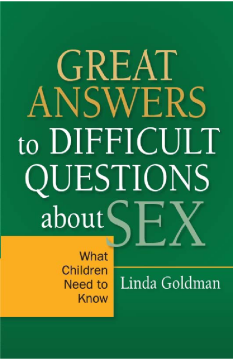
Additional Information
Book Details
Abstract
What does sex mean?
Where do babies come from?
Why is my body changing?
Sex is never an easy subject for discussion and adults often struggle to find the right words when talking about it with children. This book explores children's thoughts and feelings on the subject of sex and provides parents and other caring adults with guidance on how to respond to difficult questions.
The author explores some of the most common questions children ask about sex and provides sensitive yet candid answers, phrased in a way that children will be able to understand and relate to. Each chapter is devoted to a particular issue, such as how babies are made, relationships, and the differences between boys and girls. The book recognizes the emotions and reactions of children and family members and includes separate conclusions for adults and children.
This guide offers useful advice for parents and carers and will also be of interest to counsellors and other professionals working with children.
Covering everything from where babies come from, to describing sex, to defining gay, this is a terrific title that is well worth the money. Like the other titles in the series (e.g., Goldman’s Great Answers to Difficult Questions about Death), this will be helpful to anyone who works with or cares about children.
Library Journal
Linda Goldman is a licensed counsellor and has a Fellow in Thanatology: Death, Dying, and Bereavement with an MS degree in counselling and Master's Equivalency in early childhood education. Linda worked as a teacher and counsellor in the school system for 20 years. She has written many articles on counselling and taught and lectured at various universities, most recently in the Graduate Program of Counselling at Johns Hopkins University. Linda has a private grief therapy practice in Chevy Chase, Maryland, where she now lives. She is author of Children also Grieve: Talking about Death and Healing and Great Answers to Difficult Questions About Death, both published by Jessica Kingsley Publishers
This attractively presented booklet (112 pp) maintains the high standard we associate with Jessica Kingsley titles, though it is an easier read and ore accessible than most... The author presents a refreshing degreee of commonsense, derived from her experiencees as a teacher and school consellor. There is always a need for new books for young people on these subjects, as this is an area of human experience where values are changing all the time, while on the other hand it is one where those who transgress the accepted norms are liable to peculiarly severe penalties. Linda Goldman's book leaves me feeling a healthy breeze of commonsense. She insists that asking questions does not necessarily imply misconduct. "No question is wrong and no answer is perfect" All Questions should be answered honestly, taking into account the age of the child who asks it... Many adults as well as yung people need to read this book. It ends with useful checklists, one for children and one for 'caring adults', and a comprehensive list of websites and resources.
Quakers in criminal justice, Adrian Smith
Talking with children about sex can be intimidating, but this book helps parents and caring adults navigate these conversations in a nurturing way....This short volume is full of suggestions in a simple question-and-answer format and provides easy reference and ideas for answering children's questions. There are three appendices, including one with a list of web and print resources to supplement information targeted at children and adults.
GLBT Reviews
This little book has ten chapters addressing children's questions about where babies come from, how women get pregnant, male and female bodies, sex, puberty, love, gender, homosexuality and different kinds of families. Linda Goldman's basic recommendation is that children should be told the truth at the level they are capable of understanding. She argues that it is always a mistake to give children false information, but also points out that they may not want to have much detail when they are young. The underlying approach of the book is liberal; she thinks that information is useful and that children benefit from exploring on their own in appropriate ways. All the way through the book, she gives examples of children's questions and sample answers.
Metapsychology Online Reviews
